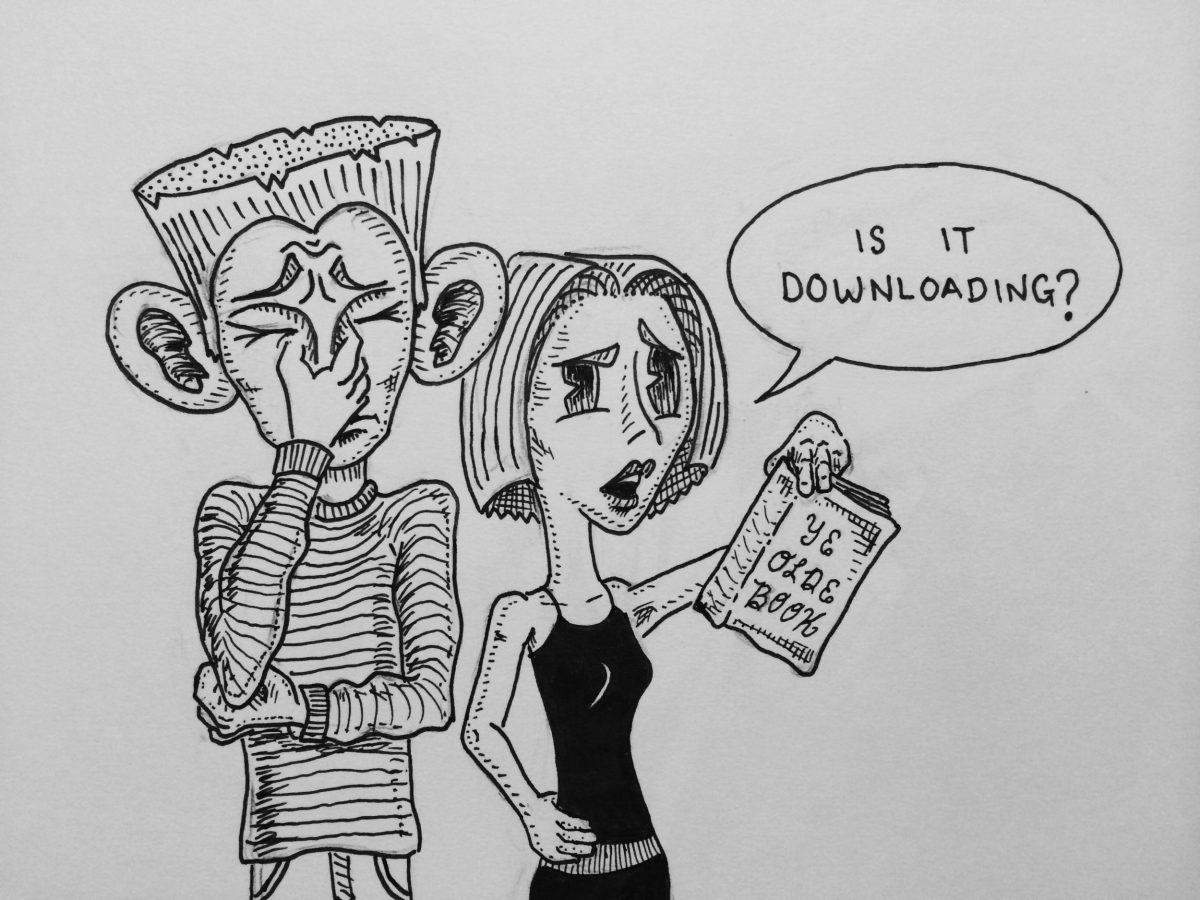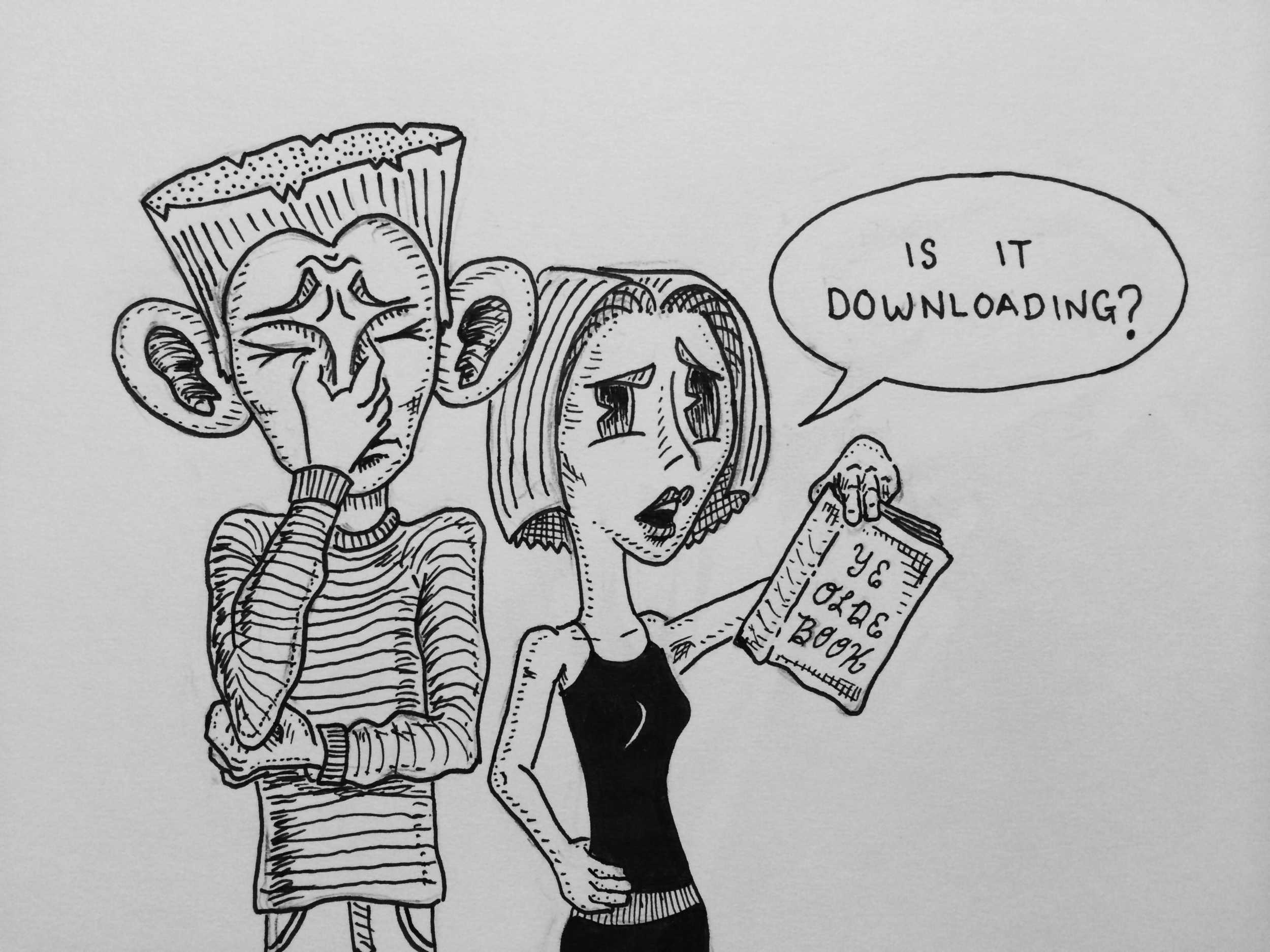Let’s make a bet on how long you’ll take before you stop reading this article. We’re willing to wager you won’t make it to the very end, but we would love for you to prove us wrong.
As editors of this publication, we are told quite frequently that we are working for a dying industry (albeit we don’t get paid, but it still isn’t very reassuring).
Perhaps it was a long time coming. How could anyone look at boring old paper with some plain ink that happens to resemble words? Especially when they could go on YouTube, watch a one-minute video about the same topic – or about cats, whatever they prefer – Tweet it, Pin it and update their Facebook about how much they loved or hated it?
While we freak out when our laptops freeze, when our smartphones take forever to update and when our tablets run out of battery, our books are stacked neatly on shelves, covered in dust and begging to be opened. And while BuzzFeed and “The Daily Show with Jon Stewart” are entertaining, low-commitment timesavers that give you a glimpse of news served with a guaranteed laugh, thousands upon thousands of words are left unread in a collection of pages we call a “newspaper,” once a staple in everyday life.
Ah, so now we’ve got you hooked on reading this. Perhaps because you’ve noticed the same trend. Or perhaps because you’re wondering what a bunch of 20-somethings think they know about reading. Frankly, we’re a little surprised you’re still here – don’t you have some Instagramming to do?
Admittedly, we can’t sit upon our pedestal and blast everyone for not reading – one of the strongest, most educated, global past times of humanity – because we are guilty of the same crime.
Take us editors, for example. When we’re not devoting hours toward this newspaper, we’re going to class, working part-time jobs, staying involved with other on-campus organizations and doing homework – all while trying to maintain a social life and get a decent amount of sleep every night. Most of the time, all we want to do when we finally have a moment alone is lie down, inhale some Girl Scout cookies and do something that doesn’t require any more brain power than we’ve already exhaustingly exerted during the day.
But even the busiest, most accomplished men and women of generations before us had just as many, if not more, of the responsibilities we have. Yet they still had time to read “Moby Dick,” “Pride and Prejudice,” “The Odyssey” and “A Tale of Two Cities” – just a small sample of thousands of knowledge gateways that put our “Harry Potter” and “Hunger Games” book trophies to shame.
So if there are still the same number of hours in the day as there were for decades before us, how come we suddenly “don’t have time” to read anymore?
Media and technology are evolving so rapidly that we fail to notice, simply because we are neck-deep in it. With six-second Vine videos and 140-character Tweets, the depth of our communication is shrinking along with our attention spans.
And according to a recent Pew survey, 56 percent of Americans now own smart phones – meaning our school and work communication are literally attached to our hips. Gone are eight-hour workdays; round-the-clock e-mail responsiveness is here to stay.
It is, however, a double-sided coin – there’s no denying that technologically-enhanced social media has accelerated worldwide access to breaking news and information (provided, of course, a cell phone or Wi-Fi connection is available).
How many of us would have learned about the Lord’s Resistance Army without seeing the viral “Kony 2012” video? Was the first time you heard about Osama bin Laden’s assassination through Facebook? Would #OccupyWallStreet have traveled all the way to the West Coast without YouTube and Twitter?
For better or worse, information now travels virtually at the speed of light. And one might ask, “As long as information is traveling, who cares if you digest it within 15 minutes or 30 seconds?”
Well, we do. We care because so much is lost when reading is taken for granted and forfeited for the sake of speed. Not only are great works of literature hanging off the cliffs of yesteryear, but the limitless depths of knowledge found in eloquently crafted words and carefully conducted research are constantly overridden by shouts of hashtags, “The Walking Dead” recaps and “Top 10 Reasons Why” lists. Many of these voices are passion-driven, which can be valuable at times. But more often than not, the credibility of these sources is questionable at best (there’s a reason why our professors warn against Wikipedia, but students spend five minutes on that website and throw away any hope of opening a real encyclopedia).
Our access to knowledge is condensing into clickable, graphic webpages that are built with the assumption that, according to statisticbrain.com, only 49 to 28 percent of the words will be read (the percentage decreases as the number of words increases).
So next time you want to check in on the Kardashian family, scroll Justin Bieber’s Twitter feed or even check Yahoo! for the latest “news,” pick up a book or a newspaper. You’ll be surprised that, even though nothing is interactive or actively competing for your attention, and even though you’ll have to commit a little more time, your brain might enjoy swapping the fast pace of new media with some slow, relaxed intellect to chew on.
Look, you made it to the end! And we lost our bet. Be honest: did you check your phone at some point? Regardless, now that you’ve proved us wrong on the reading aspect, do us one further: prove you know how to write and send a letter to the editor at [email protected] (use snail mail if you’re feeling extra nostalgic).





![[Both photos courtesy of sonoma.edu]
Ming-Ting Mike Lee stepped in as the new SSU president following Sakakis resignation in July 2022](https://sonomastatestar.com/wp-content/uploads/2024/04/CC4520AB-22A7-41B2-9F6F-2A2D5F76A28C-1200x1200.jpeg)



























